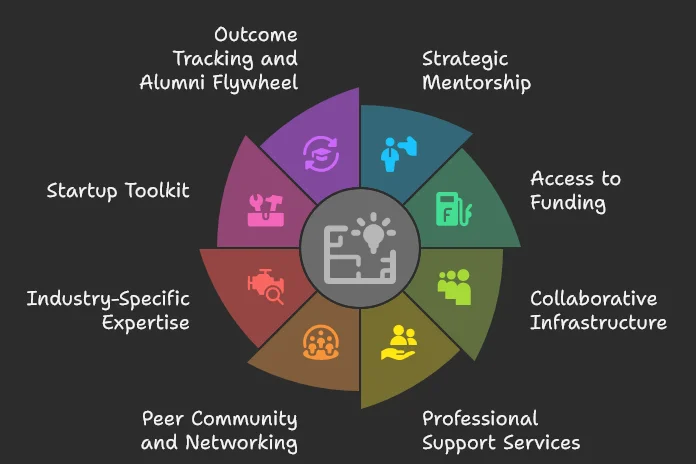Features of Business Incubators: 8 Proven Ways They Speed Up Startup Success in 2025

The journey from concept to scalable business is full of challenges. The road is packed with hurdles, some predictable, others completely out of the blue. Business incubators level the playing field by offering targeted support like workspace, mentorship, funding connections, and professional services that dramatically boost startup success rates.
Startups that grow within an incubator are almost twice as likely to secure funding. Even better? They enjoy a three-year survival rate of 75%, while others outside this ecosystem hover around 50%. It’s no wonder the incubator industry is expanding steadily, growing at 8% year over year.
Let’s understand the key features of business incubators that empower founders to choose the right environment for their ideas.
Why the right incubator matters for startups in 2025
Picking the right startup incubator is a risk-reduction move. We’ve already seen how ventures nurtured inside an incubator have a higher survival rate.
Capital access improves, too. A 2024 study for the US Congress found that start-ups graduating from top programmes raised 50% to 170% more money than similar founders who were rejected, proving that warm introductions and pitch coaching convert into cash.
In 2025, founders face tighter funding cycles, rising talent costs, and rapid AI-driven shifts in every sector. The right incubator gives you early runway, seasoned mentors, and a peer network that shares live intel.
Read more about the importance of business incubation for startups
Top 8 features of business incubators you should check before you apply
The way an incubator in entrepreneurship has transformed is nothing short of remarkable. What once started as simple shared office spaces has now grown into full-fledged ecosystems designed to fuel every step of early-stage growth.
Today’s top business incubator is a blend of both physical and virtual worlds. Think hands-on mentorship, expert advisory, top-notch professional services, and a buzzing community that keeps the energy high.
But not all startups thrive in these cohorts, especially those that move faster (or slower) than the average timeline. That is why GrowthJockey offers flexible engagement models tailored to a startup’s stage. So whether you’re validating an idea, building your MVP, or scaling after product-market fit, the support flexes to match your stage.
Regardless, the real magic happens when driven founders work side by side. The cross-learning is powerful. Let’s check out how incubators help startups in growth!
Here is a detailed breakdown on benefits provided by business incubators.

1. Strategic mentorship: The human capital that drives success
What truly sets a successful incubator apart is the power of mentorship. The best programs keep a tight mentor-to-startup ratio, often around 3:1. This means every founder gets direct access to seasoned entrepreneurs, investors, and industry experts who’ve seen the highs, the lows, and everything in between.
Here is what that looks like in practice:
-
Structured face time, not ad-hoc chats: Regular, scheduled mentorship, like weekly 1:1s or monthly mock board meetings, helps build deep familiarity with the startup’s evolving context. This consistency allows mentors to challenge assumptions, stress-test decisions, and catch strategic missteps before they become costly.
-
Operators over keynote celebrities: Founders don’t need inspirational talks; rather, they need people who’ve actually built and scaled companies. Great mentors are often former product leads, growth heads, or startup founders who’ve navigated the messiness themselves.
-
Skin in the game: When mentors are granted a small equity or advisory stake, their incentives align with the founder’s long-term success. This means they’re less likely to offer flashy shortcuts and more likely to help build something sustainable. It turns guidance into partnership, and advice into accountability.
What’s even more remarkable is how these relationships evolve. Long after demo days and graduation, many founders continue to lean on their mentors, turning initial advice into lasting, strategic partnerships that drive growth for years to come.
2. Access to funding: Warm introductions, faster cheques
Honestly, funding is the fuel that keeps any young venture moving forward. That’s exactly where this incubator function comes in, helping founders punch well above their weight. They do this by making targeted introductions to investors they already have relationships with, usually after helping the founder get their pitch, metrics, and timing just right.
Instead of cold outreach, founders walk into meetings with context, credibility, and a clear story, making those conversations far more productive.
Some even sweeten the deal with upfront capital. This is usually a small investment, often in the form of a convertible note or SAFE, that gives startups early runway to build, test, or hire before raising a full round.
And the numbers? They speak for themselves. Around 27% of startups coming out of incubators land their first funding round within a year. Compare that to just 15% without that support. The reason is clear.
3. Collaborative infrastructure: Spaces and systems that foster growth
The best incubators are designed to spark ideas the moment someone walks in. Think open lounges where casual chats turn into big plans. Purpose-built labs where hands-on testing happens side by side. Flexible meeting spaces that shift as quickly as conversations do.
That doesn’t happen by accident. Incubators set the stage by curating who shares the space, designing workflows around peer learning, and creating rituals like founder standups, product demos, or shared feedback sessions.
Even the layout of the space is intentional, bringing together teams working in similar industries or at similar stages to nudge collaboration forward.
Yet, it doesn’t just stop at the office walls. The smartest incubators extend this same environment online. Digital tools handle everything from matching mentors to facilitating peer feedback, running async updates, and hosting virtual demo days.
This way, even remote teams can plug into the same momentum as those brainstorming over coffee two desks away.
4. Professional support services: Legal, financial, and administrative excellence
Starting a venture is exciting, but let’s be honest: The legal, financial, and administrative side can feel like a maze. That’s where incubators really show their value. They step in with practical support, whether helping set up the company, securing IP, drafting contracts, or staying on top of compliance.
Everything’s simplified through in-house experts or trusted partners offering founder-friendly rates. Money matters? Handled. From day-to-day bookkeeping to clean, investor-ready reports, the back office stops being a time sink. No more late nights wrestling with spreadsheets.
Add to that the convenience of secretarial support, mail handling, and even access to group insurance plans, and suddenly, the clutter disappears. It’s all designed to let the team stay lean, focused, and moving fast.
5. Peer community and networking: A built-in support circle
A core aim of business incubator services is to immerse startups in a thriving community. Incubators organise regular events like mentor mixers, pitch sessions, workshops, and demo days. These gatherings allow founders to network with fellow entrepreneurs, industry leaders, potential customers, and even other startups.
The goal is to create a sense of mutual support rather than competition. It’s common to build a startup “cohort” community inside an incubator. Founders hold informal meetups to share challenges and swap feedback. This peer-to-peer learning is extremely valuable - one startup’s failure or success is a lesson for another.
Such networks often extend beyond the incubator's walls, too. Alumni networks stay active, and sister programs may cluster around cities or industry sectors.
6. Industry-specific expertise and resources: Specialised expertise for targeted wins
Some features of business incubators are sector-focused, meaning they specialise in certain industries (for example, fintech, biotech, cleantech, or media). In those programs, the entire ecosystem is tailored to that domain. This could mean specialised lab equipment, access to industry-specific data sets, or relationships with corporations in that field.
For instance, the Youngstown Business Incubator in Ohio focuses on IT companies, so it provides data science resources and corporate tech connections that a generic incubator might not. Even broadly-focused incubators incorporate industry expertise when possible.
They curate mentor panels featuring veterans from key sectors and invite guest speakers with relevant expertise. They might run workshops on regulatory issues specific to healthcare or finance, or coordinate pilot programs with corporate partners in relevant industries. This means a startup with specialised needs finds the right tools and advice without searching for it.
7. Startup toolkit: Resources incubators provide
In addition to space and advice, incubators often stockpile a “toolkit” of software, services, and knowledge bases for startups. They negotiate deals with software and cloud providers to give incubator members free or discounted credits.
It’s common to see arrangements with tech giants: for example, startups in many incubators can claim free AWS or Google Cloud credits, licenses for design tools, project management software, and more. These kinds of tech perks save thousands in early costs.
A great example is Growthjockey, a leading business accelerator in India. They offer a suite of over 20 AI and tech-powered tools (like Intellsys.ai for marketing intelligence and OttoPilot for scaling operations), which are integrated into their venture-building process.
This means an incubated founder might get a year of free branding or data automation, little things that add up. Incubators also stock resource libraries. For instance, they might provide access to market research reports, patent databases, or fundraising guides. Startups can attend internal training modules on topics like UX design or digital marketing.
8. Outcome tracking and alumni flywheel: Collaboration that compounds
Incubators schedule structured collaborative developments. Cross-company hackathons, shared problem-solving workshops, and inter-venture project sprints are some of the benefits provided by business incubators that transform groups of startups into synergistic forces for innovation.
There, the founders learn how to use each other's strengths again by sharing resources to get into new markets together or work together to make goods that work well together.
More collaboration happens when more experienced graduates come back to teach or co-found other start-ups. This creates a cycle of shared success. Some of the most successful startups in the world have come from incubators. One of the main reasons for this is a mindset of collective innovation.
Key takeaways: The launch pad your start-up needs
Stepping into an incubator is about stepping into an ecosystem where ideas move faster, connections grow stronger, and success feels a little more within reach. The right incubator becomes that launchpad where access to markets, investors, and mentorship feels seamless.
Innovation happens when the right people, the right guidance, and the right resources come together.
GrowthJockey - Startup Accelertor in India stands ready to guide entrepreneurs through every phase of incubation as one of the best business incubators in India. Think of it as your behind-the-scenes growth partner.
Whether it’s choosing the perfect incubator model, shaping mentorship programs that actually deliver value, locking in the right partnerships, or fine-tuning operations with real-time data, GrowthJockey has the playbook ready.
FAQs on the features of business incubators
1. What is a business incubator and how does it work?
A business incubator is a structured programme that gives early-stage companies affordable workspace, hands-on mentoring, investor access and discounted professional services. Support can be physical or virtual and usually runs for several months to a few years, helping founders move from idea to sustainable revenue.
2. Are business incubators free, or do they take equity?
Costs vary. Some universities or non-profit incubators are free or charge a modest fee. Most for-profit models take 5-15% equity or charge membership fees in return for resources and network access, so read the terms of how a startup incubator works before you sign.
3. What is the difference between an incubator and an accelerator?
Incubators focus on idea-stage ventures, run one-to-five years and rarely invest cash. Accelerators are cohort-based sprints of three-to-six months that invest small amounts of capital for equity and push teams that already have an MVP to scale fast.








